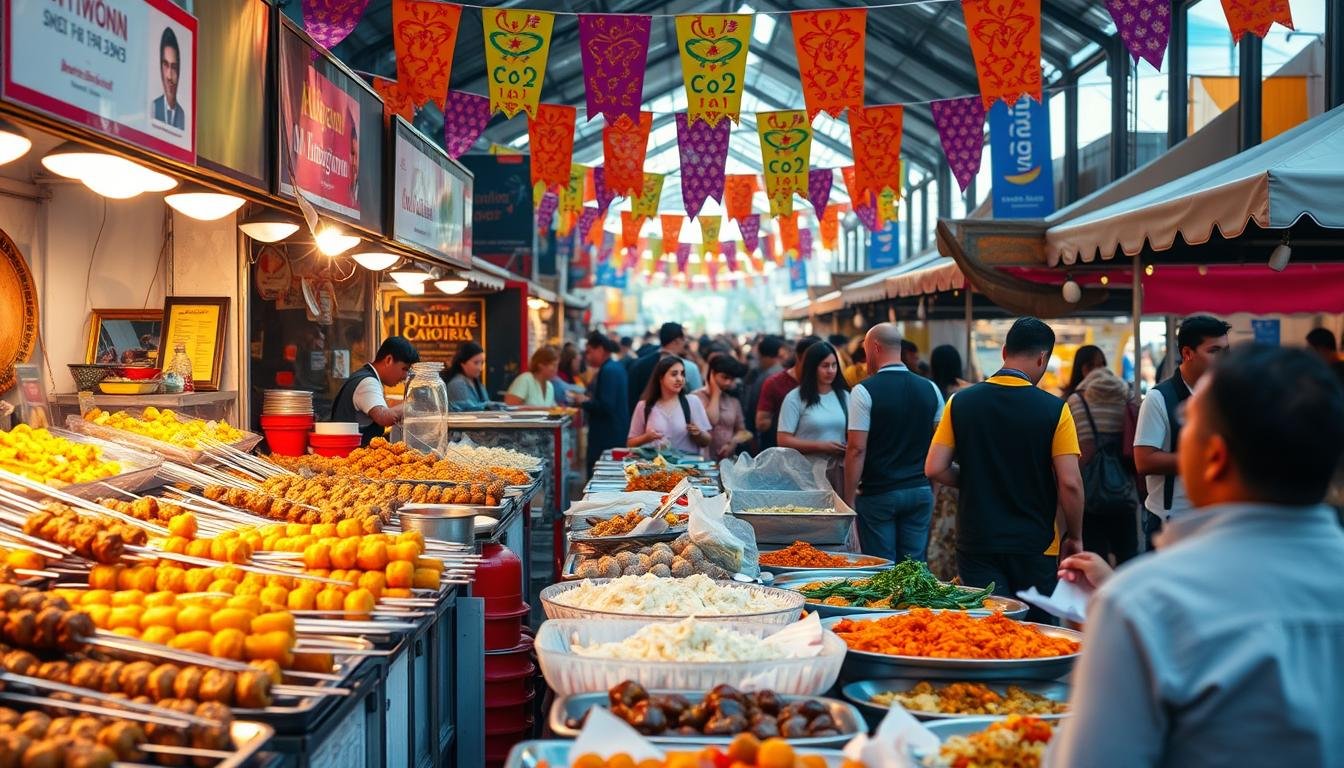Are you ready to dive into the world of rich flavors and aromas? The growth of gourmet food festivals has changed how we enjoy food and wine. It brings chefs, food lovers, and local producers together.
These festivals are now a big part of the food world. They celebrate the beauty of cooking. When planning your next foodie event, it’s important to know the trends, challenges, and chances in this field.
Key Takeaways
- Culinary festivals have become a big part of food culture.
- Gourmet food festivals offer a place for chefs and local producers.
- These events have a big impact on local economies.
- Foodie events are growing, thanks to more people interested.
- The culinary festival scene is changing with new trends.
Introduction to Culinary Festivals
Exploring food and wine events reveals that culinary festivals are more than gatherings. They are experiences that unite diverse culinary delights.
Culinary festivals are key in the food world, offering something for every food lover. They are perfect for locals and visitors alike, showcasing the best of local and international dishes.
What Are Culinary Festivals?
Culinary festivals celebrate food, wine, and culinary arts. They range from small local events to big international festivals with famous chefs and producers. These festivals are a place for culinary creativity, learning, and fun.
At these festivals, you’ll find cooking demos, wine tastings, and workshops. They let you try many cuisines and learn from top chefs and food experts.
Brief History of Culinary Festivals
Culinary festivals have a long history, starting with traditional harvest and food festivals. Over time, they’ve grown to include many culinary traditions and new ideas.
The growth of culinary festivals shows how society’s views on food, culture, and community have changed. Today, these events are about celebrating food and bringing people together. They also highlight local culinary talent.
Popular Culinary Festivals Across the U.S.
The U.S. is home to many food and wine events that draw visitors from all over. These culinary celebrations let you taste the wide range of flavors and dishes America offers.
South Beach Wine & Food Festival
The South Beach Wine & Food Festival is a highlight in the culinary world. It takes place in Miami every year. Top chefs, winemakers, and food lovers gather for cooking demos, wine tastings, and fine dining.
NYC Wine & Food Festival
The NYC Wine & Food Festival celebrates food and wine. It offers cooking classes, wine pairings, and appearances by famous chefs. It’s a top spot for those who love culinary celebrations.
Food & Wine Classic in Aspen
The Food & Wine Classic in Aspen is a top event. It combines food and wine events with stunning views. You’ll see cooking demos by famous chefs, wine tastings, and live music.
These festivals highlight the best of American food. They’re a chance for chefs and food lovers to share their passion. Whether you’re a foodie or just enjoy trying new tastes, these tasting events will impress you.
The Role of Local Ingredients in Festivals
Many culinary festivals focus on local ingredients, celebrating the diversity of what’s grown nearby. These events promote regional flavors and support local farmers and economies. Exploring these festivals can deepen your appreciation for the culinary arts.
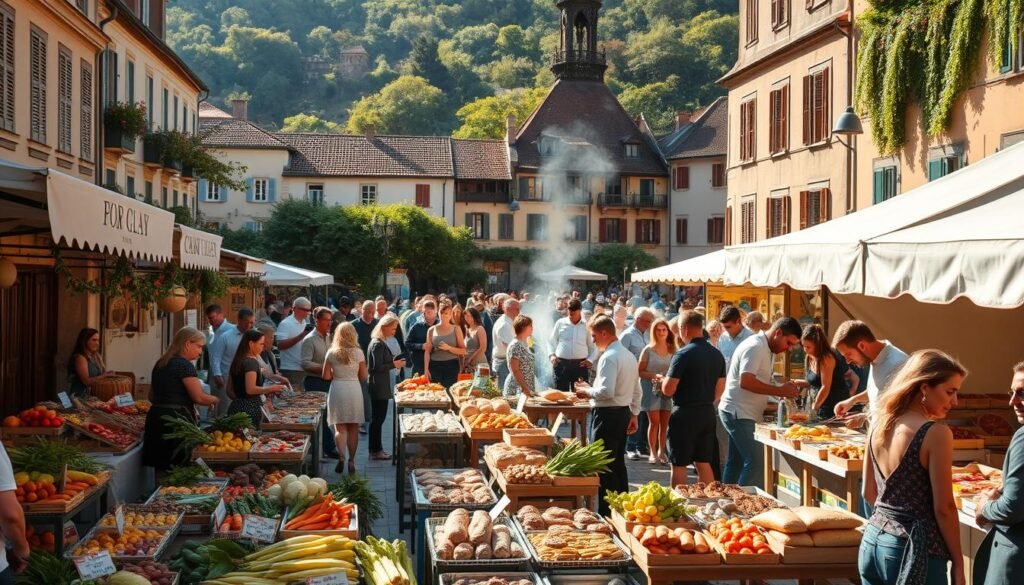
Farm-to-Table Philosophy
The farm-to-table movement has changed how chefs cook, using fresh, seasonal ingredients. At festivals, this is seen in dishes that showcase the region’s best. Chefs create menus that are tasty and reflect the local culture and environment.
Benefits of Farm-to-Table:
- Promotes local agriculture by supporting local farmers
- Ensures freshness and quality of ingredients
- Encourages sustainability by reducing carbon footprint
- Showcases regional flavors and culinary heritage
Showcasing Regional Flavors
Culinary festivals offer a chance to taste a region’s rich culinary heritage. They highlight local ingredients and products, giving a glimpse into the region’s identity. From artisanal cheeses to fresh produce, the variety shows the region’s agricultural wealth.
Regional flavors are more than ingredients; they’re about traditions and techniques passed down. At festivals, you can see live cooking, taste local dishes, and learn their stories. This experience lets you appreciate the depth and variety of local cuisines.
When you go to culinary festivals, look for the focus on local ingredients and farm-to-table. These aspects make the experience better and support sustainability and authenticity. By supporting local producers, you help the local economy and preserve culinary traditions.
Culinary Competitions and Challenges
For many, the best part of a culinary festival is watching or joining a cooking competition. These events let chefs show off their skills and creativity. They also entertain the audience.
Iron Chef Style Battles
Iron Chef-style battles are a hit in culinary competitions. Chefs get a secret ingredient and must make dishes fast. This tests their creativity and culinary skills under pressure.
Some key features of Iron Chef-style battles include:
- Secret ingredients that challenge chefs to think on their feet
- Time constraints that simulate the pressure of a real kitchen
- A panel of judges who critique the dishes based on taste, presentation, and creativity
Cooking Demos vs. Competitions
Cooking demos let chefs share their techniques and recipes. Competitions, however, add a challenge and competition element. Cooking demos are educational, teaching new skills. Competitions focus on showcasing culinary expertise under pressure.
Here are some differences between cooking demos and competitions:
| Aspect | Cooking Demos | Competitions |
|---|---|---|
| Purpose | Educational, sharing techniques | Showcasing skills, competition |
| Format | Step-by-step cooking instructions | Timed challenges, secret ingredients |
| Outcome | Learning experience for attendees | Winner is announced based on judges’ scores |
Culinary competitions and challenges are key parts of the festival. They offer something for everyone. Whether you’re a chef or an attendee, these events are unforgettable.
The Influence of Culinary Festivals on Food Trends
Culinary festivals are key in shaping the future of food. They highlight new trends and sustainable practices. By exploring these festivals, you can stay updated on food trends.
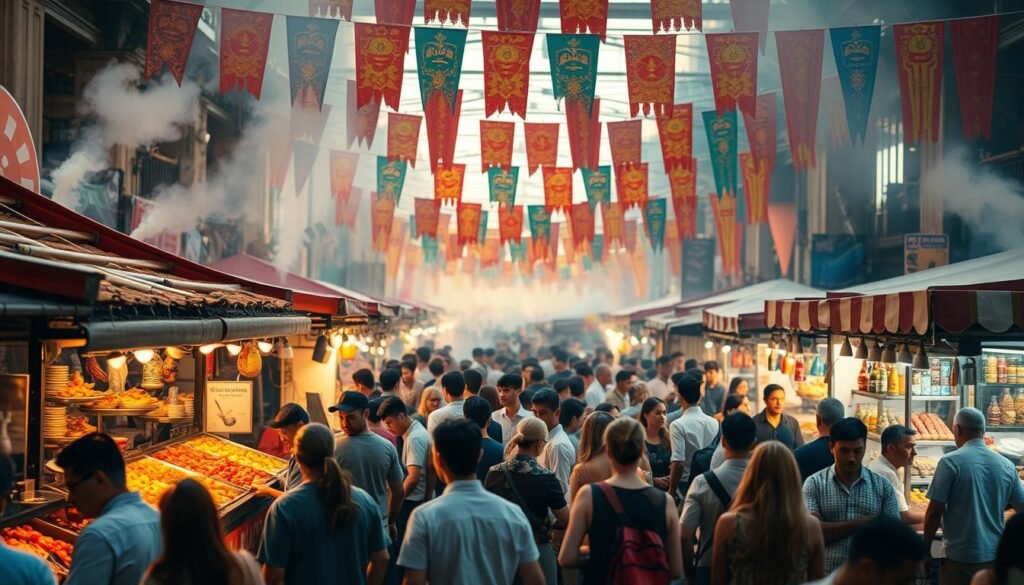
Emerging Culinary Trends
Culinary festivals are where new food trends start. They give chefs and food makers a chance to show off their latest creations. Some trends that have come from these festivals include:
- Plant-based cuisine: This trend is growing as people become more aware of environmental issues.
- Global flavors: Festivals celebrate global cuisines, introducing new flavors and cooking methods.
- Sustainable seafood: Chefs and producers are now focusing on eco-friendly fishing practices.
Sustainability and Food Festivals
Sustainability is a big theme at many culinary festivals. Organizers and participants are working to reduce waste and use local ingredients. They also promote eco-friendly practices. Some ways they do this include:
- Starting composting and recycling programs to cut down on waste.
- Encouraging the use of local ingredients to lower carbon footprint.
- Teaching attendees about sustainable food practices through workshops and demos.
By going to culinary festivals, you’re not just trying new foods. You’re also helping to make the food culture more sustainable. As these events grow, they will continue to shape the future of food.
The Economics of Culinary Festivals
Culinary festivals have a big impact on local communities. They are more than just food and culture celebrations. They are key players in boosting local economies.
Boosting Local Economy
Culinary festivals draw visitors from all over. This brings money into the local economy in many ways. Tourism benefits greatly, as people spend on places to stay, eat, and visit.
This extra spending helps local businesses grow. It creates a positive effect that helps the whole community.
Local farmers and artisans also gain from these events. They get to show and sell their products. This farm-to-table philosophy supports small farmers and boosts the local economy.
Impact on Hospitality Sector
The hospitality sector feels the effects of culinary festivals too. Hotels, restaurants, and more see a big increase in demand. Hotels fill up, and restaurants see more customers, leading to more sales.
These festivals also make a place more appealing to visitors. This can lead to more visitors in the future. It makes the area known for its food and culture.
Understanding the economic benefits of culinary festivals shows their value. They help local communities and the hospitality sector grow. Whether you own a business, are a chef, or just love food, these festivals offer many chances for growth and connection.
Networking Opportunities for Chefs and Foodies
Culinary festivals offer a chance for chefs, foodies, and industry pros to connect. These events are more than just food shows. They’re about making connections that can open doors to new chances.
These festivals attract a wide range of people. You’ll find chefs, restaurateurs, food writers, and enthusiasts all in one place. This mix creates a perfect setting for networking. You can find potential partners, learn about trends, and discover new talent.
Building Professional Connections
Networking at culinary festivals is all about making professional connections. You can join seminars, workshops, and demos to meet others. These events are great for sharing ideas and learning from each other’s experiences.
For example, you might meet a chef who needs a new supplier or a food blogger wanting to collaborate. These connections can lead to new business chances, partnerships, or friendships.
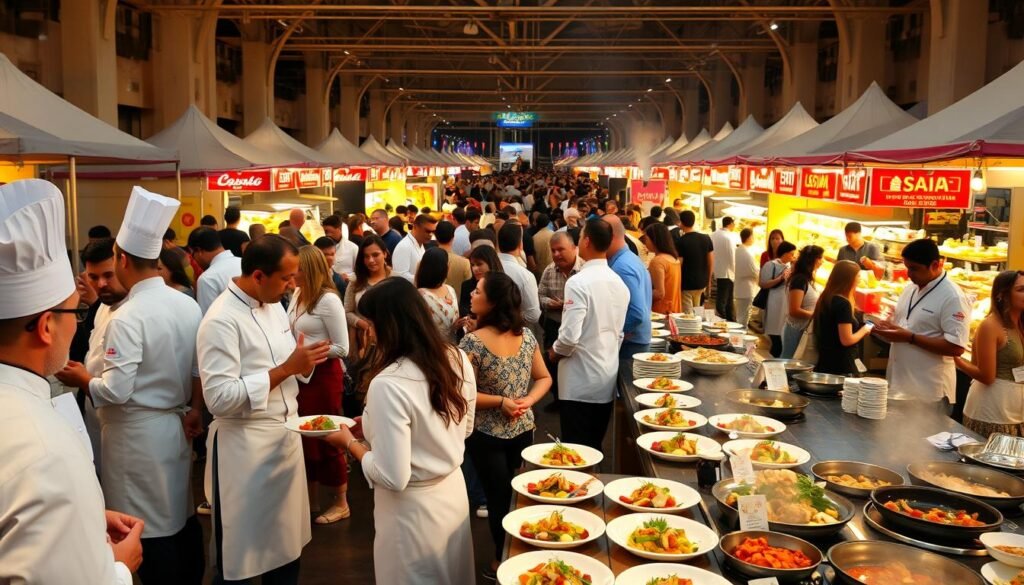
Collaborations and Partnerships
Networking at culinary festivals often leads to collaborations and partnerships. You could team up with other chefs to create a new dish or work with a supplier to develop a product. These partnerships can spark creativity and lead to new ventures.
The table below shows some possible collaborations and partnerships you might find at culinary festivals:
| Collaboration Type | Description | Potential Outcome |
|---|---|---|
| Chef and Food Supplier | Developing new products or menu items | Innovative culinary creations |
| Food Blogger and Chef | Collaborating on recipes or cooking demos | New content and exposure |
| Restaurant Owners | Sharing best practices or resources | Improved restaurant operations |
By going to culinary festivals and networking, you can explore new opportunities. Whether you’re a chef, foodie, or industry pro, these events can help you make meaningful connections. These connections can boost your career or business.
Culinary Education at Festivals
Culinary education is a big part of many festivals. They offer workshops, classes, and demonstrations by experienced chefs. These chances let people improve their cooking, learn new trends, and understand the culinary world better.
At these events, you can try different cuisines and cooking methods. From old ways to new ones, there’s a lot to learn. The hands-on nature of these sessions makes learning fun and engaging.
Workshops and Classes
Workshops and classes are key at culinary festivals. They cover a wide range of topics for all skill levels. Whether you’re just starting or already know a lot, there’s something for you. These sessions are interactive, letting you ask questions and learn from the chefs.
Some topics include:
- Cooking techniques and kitchen hacks
- Ingredient selection and preparation
- Food presentation and plating
- Cuisine-specific cooking classes
| Workshop Topic | Description | Instructor |
|---|---|---|
| Cooking Techniques | Learn advanced cooking techniques and kitchen hacks | Chef John Doe |
| Ingredient Selection | Understand the importance of selecting the right ingredients | Chef Jane Smith |
| Food Presentation | Master the art of food presentation and plating | Chef Bob Johnson |
Learning from Celebrity Chefs
Learning from celebrity chefs is a highlight of culinary festivals. These famous chefs share their knowledge through demos, workshops, and private sessions. You can learn about their cooking methods, kitchen management, and culinary views.
Learning from these chefs boosts your cooking skills and inspires you. They often bring new ideas and cooking styles, offering a fresh look at food.
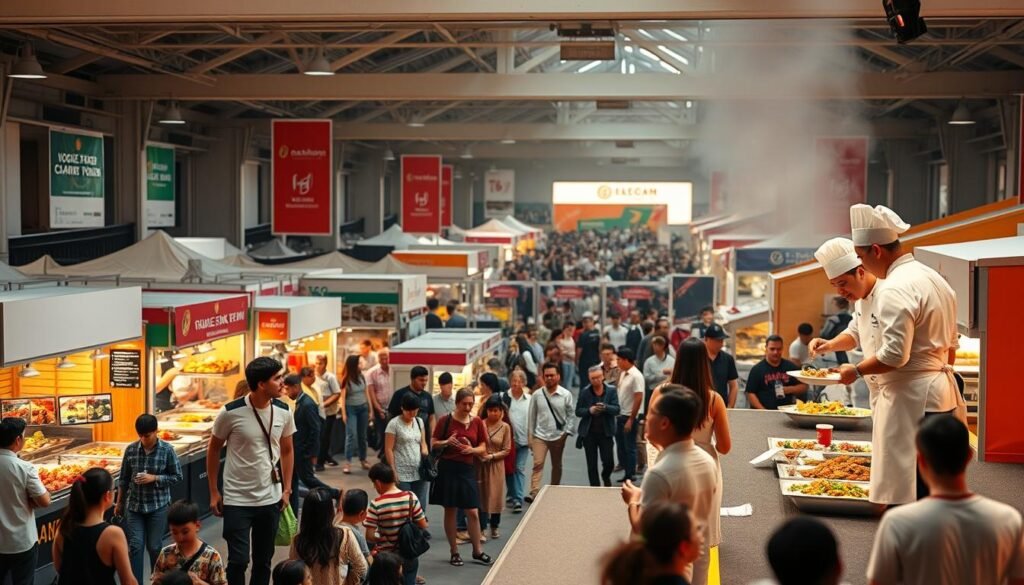
Family-Friendly Culinary Festivals
Family-friendly culinary festivals are becoming more popular. They offer fun activities for all ages. These events are great for food lovers and families with kids.
One key feature of these festivals is activities for kids. Many have special kids’ zones. Here, kids can take cooking classes, get face paint, and have fun while parents enjoy the food.
Activities for Kids
Culinary festivals are getting creative to engage kids. Some fun activities include:
- Cooking demonstrations just for kids
- Interactive food-themed games
- Meet-and-greet sessions with famous chefs
These activities are not only fun but also teach kids about food and cooking.
Family Packages and Deals
Many festivals offer special family packages and deals. These deals include discounted tickets, meal bundles, and perks like early entry.
Here’s what a family package might include at a festival:
| Package | Includes | Price |
|---|---|---|
| Family Fun Pack | 4 Festival Tickets, 1 Cooking Class for Kids, Meal Voucher | $150 |
| Foodie Family | 6 Festival Tickets, 2 Cooking Classes, Gourmet Meal Deal | $300 |
These packages help festivals attract more families. They make the event more welcoming to everyone.
In summary, family-friendly culinary festivals are making events better for everyone. They offer fun for kids and great deals for families. These festivals are becoming a favorite for family outings.
The Impact of Social Media on Culinary Festivals
Social media has changed the game for culinary festivals. It offers new ways to promote and connect with people. Now, you can enjoy culinary festivals in a fresh way, thanks to social media.
Influencers and Their Role
Influencers are key in promoting culinary festivals. They draw attention with their big followings on Instagram and Facebook. By teaming up with them, you can create exciting content that highlights the festival’s special moments.
Working with influencers brings many benefits:
- More people see the festival
- You get real content
- You reach a wider audience
Creating Buzz Before the Event
Building excitement before a culinary festival is vital. Social media lets you tease the event with sneak peeks and behind-the-scenes looks. Share menu previews, chef interviews, and other exclusive stuff to get people excited.
Good strategies include:
- Start a special event hashtag
- Post behind-the-scenes content
- Run contests or giveaways before the event
Using these tactics can make a big splash for your festival. It ensures a packed and successful event.
Trends in Culinary Festival Experiences
Culinary festivals are changing, blending food, culture, and tech. People’s way of enjoying food is evolving, and festivals are adjusting. They aim to meet these new tastes and preferences.
Virtual vs. In-Person Events
The COVID-19 pandemic made virtual events more common, including in culinary festivals. In-person events give a real, hands-on feel, but virtual ones reach more people. Many are now mixing both to get the best of both worlds.
Virtual events let people join from anywhere, saving money and the planet. Yet, they miss the personal touch and sensory delight of being there. In-person events, though, offer a chance to meet others and taste local foods.
Hybrid Festival Models
Hybrid models are becoming a hit, blending virtual and in-person parts. This way, more people can enjoy the festival, but those who go in person get a special, local feel. For instance, a festival might stream cooking shows online and hold live workshops locally.
Experts say the future of culinary festivals is in being adaptable and creative. They need to offer unique experiences for all kinds of people. Festival organizers are adding more interactive and immersive elements to their events.
« The key to a successful culinary festival is creating an experience that is both local and global, accessible to everyone. »
The culinary festival world is always changing, and the best ones will be those that innovate. By understanding these trends, you can make your festival more engaging and unforgettable.
The Future of Culinary Festivals
Culinary festivals are set to change, driven by new tastes and trends. The future looks bright, with fresh ideas popping up all the time.
Emerging Trends and Predictions
Future festivals will focus more on being green. They’ll use eco-friendly methods and highlight local foods. You’ll see more farm-to-table dishes, showing a love for sustainable eating.
Evolving Experiences
Festivals are becoming more interactive. You’ll find cooking demos, workshops, and tours behind the scenes. This shift means more variety for everyone, catering to different tastes.
Knowing what’s next in culinary festivals helps you stay ahead. Whether you love food, cook, or organize events, there’s room to grow and innovate.
FAQ
What are culinary festivals, and what can I expect from them?
Culinary festivals celebrate food, wine, and cooking. They bring together chefs, food lovers, and local producers. You’ll get to try different dishes, watch cooking shows, and meet others who love food.
What types of culinary festivals are there, and how do they differ?
There are many kinds of culinary festivals. Some focus on local food, while others are about gourmet delights. Each has its own theme and atmosphere, offering a variety of culinary experiences.
How do culinary festivals impact local economies, and what benefits do they bring?
Festivals can boost local economies by drawing visitors and supporting local businesses. They create jobs, help local farmers, and contribute to economic growth.
What role do local ingredients play in culinary festivals, and why are they important?
Local ingredients are key at culinary festivals. They let chefs highlight a region’s unique tastes. The farm-to-table movement is big here, supporting local farming and economies.
How can I make the most of my culinary festival experience, and what should I look out for?
To enjoy festivals, plan ahead and research the event. Arrive early to avoid crowds. Look for cooking demos, workshops, and tastings. It’s a chance to meet chefs and food lovers.
Are culinary festivals suitable for families, and what activities can I expect for children?
Many festivals are great for families. They offer cooking classes, workshops, and fun for kids. Check the festival’s website for kids’ activities and look for family deals.
How can I stay up-to-date with the latest culinary festival trends and news?
Follow chefs and food lovers on social media. Sign up for newsletters from festival organizers. This way, you’ll know about new trends and events.
Can I participate in culinary competitions or challenges at culinary festivals?
Yes, many festivals have cooking competitions and challenges. Check the festival’s schedule and registration to join. It’s a chance to show off your cooking skills.

